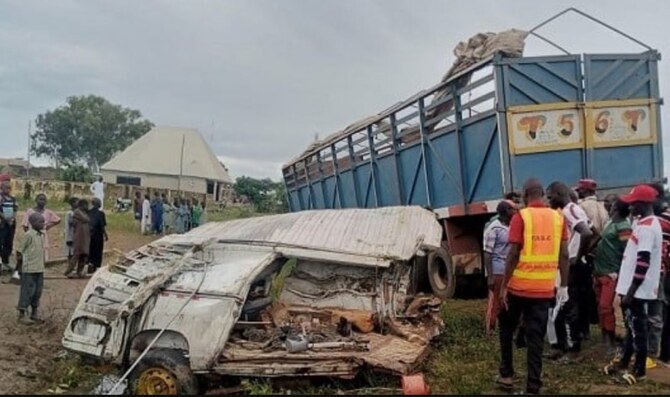KANO, Nigeria: A bus carrying Muslim faithful celebrating the birth of Prophet Muhammad crashed in northern Nigeria’s Kaduna state, killing at least 25 children, an official told AFP Tuesday.
Organizers of the religious pilgrimage gave a higher toll of 40, with 31 injured.
The accident occurred on Sunday when the speeding bus overloaded with young adherents of the Tijjaniyya Sufi order lost control and crashed into a truck in Lere district, Kabiru Nadabo, head of the local office of Nigeria’s road safety agency, FRSC, said.
“The bus was overloaded with 63 children and the driver was speeding recklessly when he lost control and rammed into an articulated truck,” Nadabo said.
“Fifteen of them died on the spot while 48 injured were taken to various hospitals, among which 10 died the following day, raising the death toll to 25,” he said.
The children were from Kwandare village and heading to the nearby town of Saminaka for the annual Maulud festivities marking the birth of the Prophet, said Nadabo.
He said the death toll could have changed since the injured were taken to hospitals in various locations and he did not get further updates.
Dikko Dahiru, one of the organizers of the trip, said 40 children were killed in the accident, while 31 were injured.
“The bus was carrying 71 passengers and 36 died instantly while four more died in hospital the next day,” said Dahiru, whose nephew was among the dead.
“Thirty-one were taken to hospitals with severe injuries, 11 of them in critical condition,” he said.
Road accidents are common on Nigeria’s poorly maintained roads due largely to speeding and disregard for traffic rules.
Nigeria bus crash kills at least 25 children on religious trip
https://arab.news/wxjy2
Nigeria bus crash kills at least 25 children on religious trip

- Organizers of the religious pilgrimage gave a higher toll of 40, with 31 injured
- The children were from Kwandare village and heading to the nearby town of Saminaka for the annual Maulud festivities marking the birth of the Prophet
Russia strikes power plant, kills four in Ukraine barrage

KHARKIV: Russia battered Ukraine with more than two dozen missiles and hundreds of drones early Tuesday, killing four people and pummelling another power plant, piling more pressure on Ukraine’s brittle energy system.
An AFP journalist in the eastern Kharkiv region, where four people were killed, saw firefighters battling a fire at a postal hub and rescue workers helping survivors by lamp light in freezing temperatures.
Ukrainian President Volodymyr Zelensky said “several hundred thousand” households near Kyiv were without power after the strikes, and again called on allies to bolster his country’s air defense systems.
“The world can respond to this Russian terror with new assistance packages for Ukraine,” President Volodymyr Zelensky wrote on social media.
“Russia must come to learn that cold will not help it win the war,” he added.
Authorities in Kyiv and the surrounding region rolled out emergency power cuts in the hours after the attack, saying freezing temperatures were complicating their work.
DTEK, Ukraine’s largest energy provider, said Russian forces had struck one of its power plants, saying it was the eighth such attack since October.
The operator did not reveal which of its plants was struck, but said Russia had attacked its power plants over 220 times since Moscow invaded Ukraine in 2022.
Daily attacks
Moscow has pummelled Ukraine with daily drone and missile barrages in recent months, targeting energy infrastructure and cutting power and heating in the frigid height of winter.
The Ukrainian air force said that Tuesday’s bombardment included 25 missiles and 247 drones.
The Kharkiv governor gave the death toll and added that six people were wounded in the overnight hit outside the region’s main city, also called Kharkiv.
White helmeted emergency workers could be seen clambering through the still-smoking wreckage of a building occupied by postal company Nova Poshta, in a video posted by the regional prosecutor’s office.
Within Ukraine’s second city, Kharkiv Mayor Igor Terekhov said a Russian long-range drone struck a medical facility for children, causing a fire. No casualties were reported.
The overnight strikes hit other regions as well, including southern city Odesa.
Residential buildings, a hospital and a kindergarten were damaged, with at least five people wounded in two waves of attacks, regional governor Sergiy Lysak said.
Russia’s use last week of a nuclear-capable Oreshnik ballistic missile on Ukraine sparked condemnation from Kyiv’s allies, including Washington, which called it a “dangerous and inexplicable escalation of this war.”
Moscow on Monday said the missile hit an aviation repair factory in the Lviv region and that it was fired in response to Ukraine’s attempt to strike one of Russian President Vladimir Putin’s residences — a claim Kyiv denies and that Washington has said it does not believe happened.












